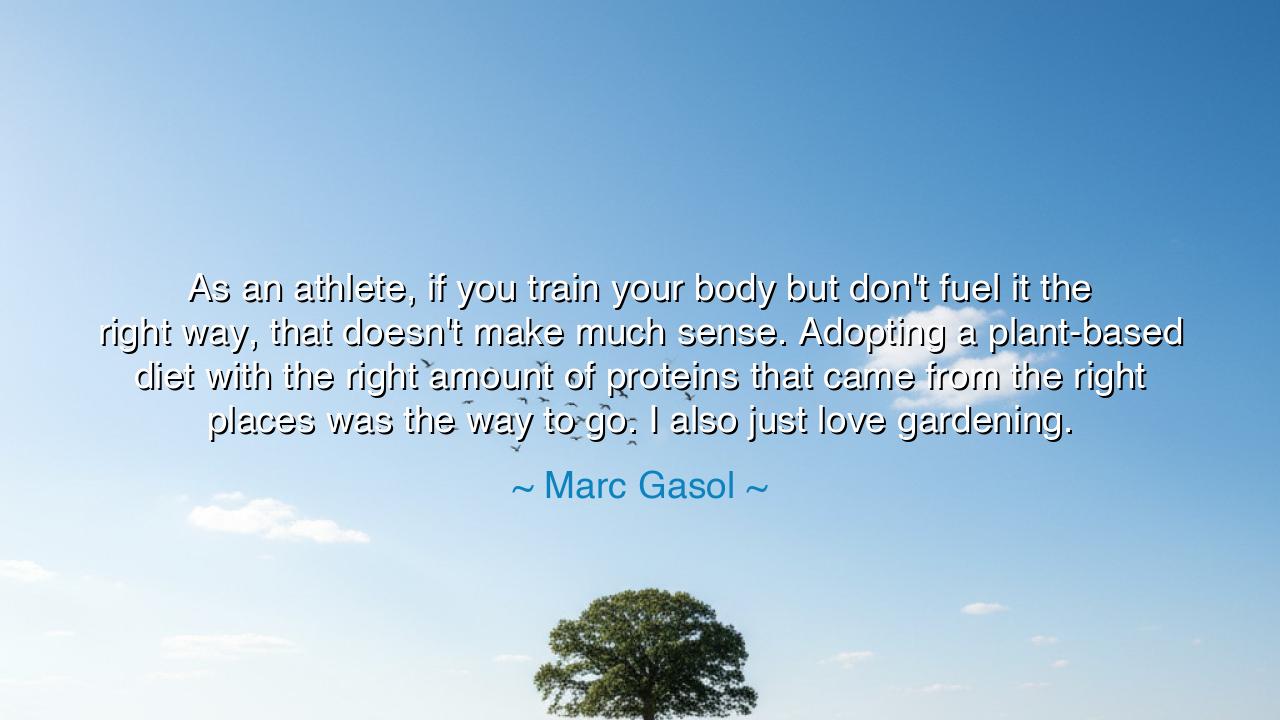
As an athlete, if you train your body but don't fuel it the right
As an athlete, if you train your body but don't fuel it the right way, that doesn't make much sense. Adopting a plant-based diet with the right amount of proteins that came from the right places was the way to go. I also just love gardening.






In the vast arena of life, where strength is not just measured by the body but by the balance of all things, the ancient wisdom reminds us that true power comes not from sheer exertion alone, but from the nourishment that sustains the body, mind, and spirit. Marc Gasol, in his insight, speaks to this truth: "As an athlete, if you train your body but don't fuel it the right way, that doesn't make much sense. Adopting a plant-based diet with the right amount of proteins that came from the right places was the way to go. I also just love gardening." These words, spoken in the modern world, echo the ancient teachings that the body, in its pursuit of strength, must be nourished not just with any fuel, but with purposeful and pure sustenance.
In the ancient world, the Greeks—those first seekers of balance between mind and body—understood that to cultivate strength was not simply a matter of rigorous exercise, but a matter of proper nourishment. Hippocrates, the father of medicine, famously said, "Let food be thy medicine, and medicine be thy food." For the Greeks, diet was not a mere afterthought but an integral part of maintaining health, vitality, and strength. The gladiators of ancient Rome, too, were aware that their bodies, as instruments of great power, required the right fuel to perform at their best. The idea that one could train tirelessly without considering the proper nutrition would have seemed as nonsensical to them as it does to Marc Gasol today. Strength, in this sense, was always understood as a harmonious balance of both physical exertion and mindful nourishment.
In Gasol’s choice of a plant-based diet, there is an echo of the ancient tradition that embraced natural foods as the source of power and healing. The ancient Egyptians, known for their wisdom and longevity, valued foods that came directly from the earth—grains, vegetables, fruits, and legumes—as their primary source of strength. Their diet was rooted in the land, reflecting the sacredness of nature’s gifts. Hippocrates also advocated for a diet that aligned with nature, believing that the earth provided everything the human body needed to thrive. To adopt a plant-based diet, then, is to reconnect with this ancient understanding—that nature, in its purest form, holds the power to restore and renew the body, offering sustenance that nourishes not only the physical form but the very spirit.
The proteins that Gasol refers to are not just nutrients to be consumed, but life forces that come from sacred places—the land, the garden, the earth. In the ancient world, the land was revered as the source of all life. The act of gardening itself was not just a means of sustenance, but a spiritual practice. The Romans, for example, built their empire on the strength of agriculture, understanding that to conquer the land was to understand the very foundation of their civilization. The cultivation of plants, whether for food or medicine, was a way of honoring the earth and receiving its bounty in return. In this sense, the act of growing one’s own food—gardening—becomes an act of reverence, a way of connecting to the world that sustains us.
In Gasol’s words, there is a wisdom that transcends time. The pursuit of physical strength and excellence must be rooted in the natural order. The body is a vessel that must be cared for with both discipline and respect. To train without providing the body with the proper fuel is an act of disrespect to the very vessel that holds our potential. The great philosopher Plato once spoke of the importance of harmony between the body and the mind, believing that the cultivation of both was necessary for true excellence. In this way, Gasol’s commitment to a plant-based diet and his love for gardening is a reflection of the ancient belief that strength comes from the earth, that true power lies not in excess or artificial enhancement, but in the purest forms of nature.
Consider the ancient Indian yogis, who often spoke of the importance of ahimsa, or non-violence, and of feeding the body with what nourishes it without harm. Many yogis adhered to a vegetarian diet, believing that the consumption of plant-based foods helped maintain clarity, peace, and strength of mind. The yogic practice of satvic food, or pure, natural food, was seen as essential for maintaining the body’s connection to the divine. For these sages, the act of eating was never just about survival—it was about aligning oneself with the universe’s natural rhythm. In this light, Gasol’s choice of a plant-based diet becomes a modern expression of this ancient wisdom—a way to honor the body’s connection to the earth and its ability to heal and restore itself.
Thus, let us follow the wisdom of Marc Gasol and the ancient sages. Let us treat the body as a sacred vessel, understanding that its strength is not born solely of effort but of mindful nourishment. Let us cultivate gardens, whether in the earth or within our own kitchens, growing the food that will sustain us, heal us, and elevate us. As we train our bodies, let us also nourish them with the purest forms of sustenance, honoring the connection between our efforts and the earth’s offerings. In doing so, we create a life that is not just strong, but whole—a life that harmonizes effort with nourishment, mind with body, and soul with the earth itself.






AAdministratorAdministrator
Welcome, honored guests. Please leave a comment, we will respond soon